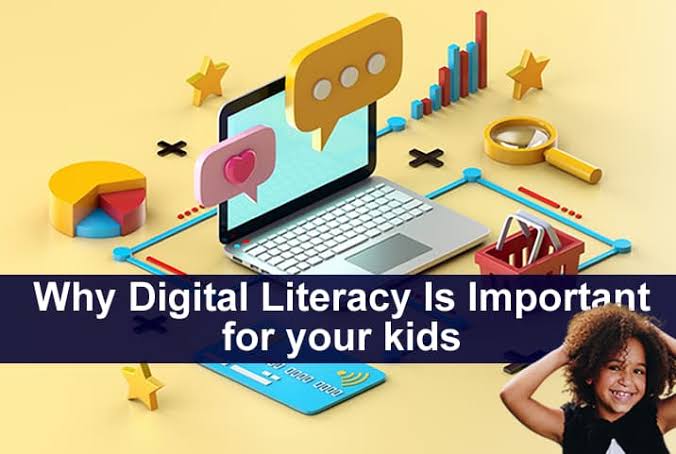In today's interconnected world digital literacy has become fundamental skill set. It is essential for navigating the complexities of the digital age. Nigeria, with its youthful population and growing access to digital technologies stands to benefit significantly from integrating digital literacy into its education system. This discussion explores the critical role of digital literacy in empowering students. It enhances learning outcomes and prepares future generations for success in a globalized economy.
Digital literacy encompasses the ability to access evaluate, use and create digital information effectively utilizing technology to communicate, collaborate and solve problems. In Nigeria where technological advancements are rapidly transforming societal norms and economic landscapes, digital literacy emerges as key enabler for educational reform innovation and inclusive growth.
Despite advancements Nigeria faces significant challenges in ensuring universal access to digital technologies and infrastructure. Disparities in internet connectivity. Electricity supply and access to devices remain barriers. Particularly in rural and underserved communities. Addressing these challenges requires strategic investments in digital infrastructure, policy reforms and partnerships with private sectors to expand access and bridge digital divide.
Enhancing Learning Experiences Through Technology Integration
Integrating digital literacy into the curriculum enhances learning experiences by providing interactive and personalized learning opportunities. Digital tools such as educational apps, multimedia resources, and online platforms facilitate active engagement, critical thinking, and collaborative learning among students. In Nigeria, initiatives that leverage technology to supplement traditional teaching methods empower educators to deliver dynamic lessons that cater to diverse learning styles and enhance knowledge retention.
Empowering Educators Through Professional Development
Effective implementation of digital literacy initiatives necessitates ongoing professional development for educators. Training programs on digital tools, pedagogical strategies, and cybersecurity equip teachers with the skills and confidence to integrate technology into classroom practices effectively. By investing in teacher training and capacity building, Nigeria can empower educators to harness the transformative potential of digital technologies and adapt teaching methodologies to meet 21st-century learning demands.
Fostering Innovation and Entrepreneurship
Digital literacy cultivates innovation and entrepreneurship by equipping students with technological skills and entrepreneurial mindset needed to thrive in a digital economy. In Nigeria, where youth unemployment remains a pressing issue, fostering digital literacy fosters a culture of innovation, creativity, and problem-solving among students. By nurturing digital entrepreneurs and innovators, Nigeria can drive economic diversification, promote job creation, and position itself as a global hub for digital innovation and technology-driven enterprises.
Promoting Digital Citizenship and Online Safety
Digital literacy promotes responsible use of technology and fosters digital citizenship by educating students about ethical behavior, online safety, and cybersecurity. In Nigeria, where online misinformation, cyberbullying, and digital fraud pose risks to digital users, integrating digital citizenship education into the curriculum empowers students to navigate digital spaces responsibly and safeguard their personal information. By promoting digital ethics and awareness, Nigeria can mitigate digital risks and empower individuals to make informed decisions in the digital era.
Leveraging Digital Resources for Lifelong Learning
Digital literacy extends beyond formal education, empowering individuals to pursue lifelong learning opportunities and continuous skill development. Access to online courses, digital libraries, and open educational resources enables students and adults alike to acquire new knowledge, explore diverse subjects, and enhance their professional competencies. In Nigeria, initiatives that promote digital inclusion and lifelong learning contribute to building a knowledgeable and adaptable workforce capable of driving sustainable development and societal progress.
Addressing Challenges and Building Resilience
Despite its transformative potential, integrating digital literacy into Nigeria's education system faces challenges such as funding constraints, inadequate infrastructure, and varying levels of digital literacy among educators and students. Addressing these challenges requires coordinated efforts from government, educational institutions, private sectors, and civil society to develop comprehensive strategies, allocate resources efficiently, and build resilience against digital barriers.
Collaboration and Partnership for Sustainable Impact
Collaboration and partnership with international organizations, technology firms, and educational stakeholders are essential for advancing digital literacy initiatives in Nigeria. By leveraging global expertise, resources, and best practices, Nigeria can accelerate progress towards achieving digital inclusion, enhancing educational outcomes, and preparing future generations for success in an increasingly digitalized world.
Conclusion: Advancing Digital Literacy for Future Success
In conclusion, digital literacy is indispensable for Nigeria's education system to empower students, enhance teaching practices, foster innovation, and prepare individuals for success in a globalized digital economy. By prioritizing digital literacy initiatives, expanding access to digital technologies, and investing in educator training, Nigeria can unlock the full potential of its youth population and drive inclusive growth and sustainable development.
Digital literacy not only equips individuals with essential skills but also fosters creativity, critical thinking, and lifelong learning habits necessary for navigating and thriving in the digital age. As Nigeria continues its journey towards educational reform and technological advancement, digital literacy remains a cornerstone for building a resilient, knowledge-based society capable of seizing opportunities and overcoming challenges in the 21st century.
